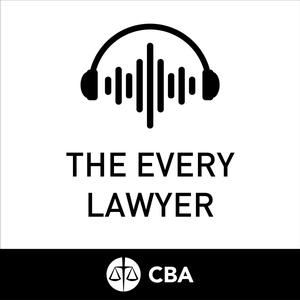
The Every Lawyer
Canadian Bar Association
The Every Lawyer is a Canadian Bar Association podcast channel bringing expert advice and insights in order to help you learn what you need to know to build your practice, no matter your year of call. Wellness, practice tips, legal trends – you can hear it on The Every Lawyer.
- 55 minutes 46 secondsLegislative Reconciliation – Naiomi Metallic on Legislating Indigenous Self-government in Child Welfare
“Legislative Reconciliation is Governments using legislative powers for good and not bad. The Indian Act, you might say, was the government using its powers for bad, for a very long time.” -Prof. Metallic
Professor Naiomi Metallic, divides her time between practice and teaching at Dalhousie University’s Schulich School of Law where she holds the Chancellor’s Chair in Aboriginal Law and Policy. She was part of the legal team that intervened on behalf of the First Nations Child and Family Caring Society led by Cindy Blackstock, a longtime advocate for child welfare and Indigenous children’s rights. The SCC referenced Prof. Metallic’s article, Aboriginal Rights, Legislative Reconciliation and Constitutionalism (dal.ca) , in their Reference re An Act respecting First Nations, Inuit and Métis children, youth and families, and she is this year’s winner of the CBA’s Ramon John Hnatyshyn Award for Law.
Also mentioned in this episode:
Supreme Court of Canada - SCC Case Information - Summary - 40619 (scc-csc.ca)
Supreme Court of Canada - SCC Case Information - Parties - 39856 (scc-csc.ca)
Braiding Legal Orders | McGill-Queen’s University Press (mqup.ca)
We highly recommend The Path:
Canadian Bar Association - Understanding the Truth and Engaging in Reconciliation (cba.org)
Reach out to us anytime at [email protected]
25 July 2024, 1:00 pm - 52 minutes 34 secondsLost in Promulgation: the trouble with Section 55
For over 157 years, the Canadian federation has derived its legitimacy from a written constitution made up of 31 documents, the majority of which have no legal force in the French language, among them the foundational Constitution Act of 1867, formerly referred to as the British North America Act. While the Constitution Act of 1982 was written and adopted in both official languages, the remaining 71% of the documents, though translated, have yet to be promulgated. 42 years and counting. How did we get here? And what are the consequences of a 71% unilingual constitution?
Professor François Larocque, holder of the first Canadian Francophonie Research Chair in Language Rights since 2018, is one of Canada’s top experts on language rights and is currently involved in litigation aimed at solving this issue once and for all.
The French version of this episode is available here: Canadian Bar Association - Juriste branché (cba.org).
Constitution bilingue / Bilingual Constitution (youtube.com)
11 July 2024, 1:00 pm - 48 minutes 17 secondsPracticing North of 60
What is it like to fly in, perhaps even get briefly stranded, and then fly back out, all the while sharing some very close quarters with both the judge and opposing counsel?
Very collegial.
Julia welcomes an ad hoc panel of pan northern practitioners and active CBA members to The Every Lawyer:
Leeland Hawkings was born and raised in Whitehorse, where he now works as legal counsel with the Yukon government; he is also the current vice president of the Yukon branch of the CBA.
Paulina Ross left her home in Yellowknife to do her JD and a Masters Degree in environmental science. She has now returned and is currently the only articling student in the Northwest Territories.
Eric Cheng is our big city litigator who answered the call and is now with the Nunavut Prosecution Service, providing access to justice for people living in some of the most remote communities in the world.
It's no surprise to anyone that there is a shortage of skills in the North, but it may surprise you just how much opportunity there is for career growth for legal professionals. You may have to bring your own mason jars.
This conversation was recorded on May 30th, 2024.
Further listening: The Place That Thaws - Podcast | APTN News
Write to us at [email protected]
20 June 2024, 1:00 pm - 1 hour 13 minutesA2J - Multidisciplinary Service Models
Overarching themes: lawyers can benefit from multi-disciplinary approaches in various ways, clients seriously benefit from holistic approaches, and that combining these two approaches is really making headway on improving access to justice for vulnerable communities.
Hosted by Julia Tétrault-Provencher and featuring:
Emily Murray Luke’s Place, legal office with social and health support workers on site, specialised on the needs of survivors of intimate partner violence. People centered approach.
Amy Slotek on her work as an embedded lawyer at a downtown Toronto mental health agency working with the homeless. Picking people up where they are.
Michele Leering on Community Lawyers, Outreach, A2J in legal education and reflective practice.
Ida Bianchi on how lack of access to all types of services, not only legal, often causes and then perpetuates people’s involvement with criminal and family justice systems.
Ab Currie on the uneven but steady march of progress on improving access to justice, the interplay between legal and non-legal problems, how these tend to cluster and feed off of one another, and that the legal profession is finally coming to realise more fully that you simply can’t solve one without solving the other.
Lisa Moore on Crossing Boundaries: Exploring Multi-Disciplinary Models for Legal Problem Resolution (2024). Lisa was the lead researcher and author and is also the director of the CFCJ.
Home - Luke's Place (lukesplace.ca)
Embedded Lawyer Program: 2022-23 annual report (legalaid.on.ca)
Home - CALC (communitylegalcentre.ca)
Michele Leering | Queen's Law (queensu.ca)
16 May 2024, 1:00 pm - 1 hour 16 minutesMasters of Mediation
There are many reasons for lawyers and litigators to consider mediation as a career move. And there are born mediators who may not have a professional legal background at all. Our goal in this episode is twofold: to make the case for mediation as a viable alternative to our over-burdened court system and to explore the role mediation plays in peace-, community-, and capacity- building on both the local and global scale. Pro-tip for seasoned professionals: mediation can also provide some relief for the feeling of burnout that can come from years of working in the adversarial system.
Julia welcomes Christine Kilby from the CBA Dispute Resolution Section. Christine and Julia introduce us to masters of mediation: Joy Noonan, Esther Omam, Mina Vaish and Archana Medhekar. Sponsored by the CBA Dispute Resolution Section: "Alternative" Dispute Resolution has never been so mainstream.
Further links:
Canadian Bar Association - Dispute Resolution (cba.org)
Ottawa Dialogue - Research & Action
Archana Medhekar - Mediators Beyond Borders International
Reach Out NGO | Cameroon (reachoutcameroon.org)
Esther Omam - Women Mediators across the Commonwealth
Esther Omam takes us on a deep dive into her work with Reach Out Cameroon during the Bakassi crisis on the border between Nigeria and Cameroon, and the Anglophone crisis in Cameroon's South West and North West Regions, still ongoing. For context:
18 April 2024, 1:00 pm - 1 hour 16 minutesActionable guidance on EDI in the face of a growing backlash – Charlene Theodore and Nikki Gershbain
Julia welcomes two of Canada’s top experts on EDI in the legal workplace: McCarthy-Tetrault’s current and former Chief Inclusion Officers, Charlene Theodore and Nikki Gershbain.
Before moving to McCarthy-Tetrault, Charlene Thedore worked as in-house council in the education sector and, in 2020, she was the first black person to become President of the OBA. Charlene has also worked for the UN committee on the elimination of racial discrimination and is a member and former director of the Canadian Association of Black Lawyers.
In addition to her pioneering work on EDI at McCarthy and starting her own consultancy firm, IDEA Consulting, Nikki Gershbain is a long-time pro bono advocate and family law practitioner and has served as Executive Director of the Faculty of Law at the University of Toronto and National Director of Pro Bono Students Canada. In 2021, she received the Canadian Bar Association’s LGBTQ Hero Award for her work on trans workplace inclusion.
This is an episode full of practical, usable, advice on achieving true equity, diversity, and inclusion, at work and everywhere else. It includes concrete examples of effective and beneficial workplace EDI policies and offers some terrific all-purpose life lessons and memorable, usable, quotes.
Charlene, Nikki and Julia discuss everything from the business case for EDI to Elon Musk's twitter beef with Mark Cuban, the need for active leadership on human rights and why trans inclusion matters; how cultural trends and current events in our increasingly polarized political and historical realities impact us at work; that “the truth is always more complex, because none of us is either totally oppressed or completely privileged" (Nikki Gershbain), and that "no one has a monopoly on being wrong" (Charlene Theodore).
Charlene Theodore | McCarthy Tétrault
Law & Disorder Inc. - Law & Disorder Inc. (murraygottheil.com)
As always, please feel free to subscribe and write to us anytime at [email protected]
21 March 2024, 1:00 pm - 1 hour 18 minutesRemaining Vigilant - barbara findlay KC and Douglas Elliott
Trail-blazing penny droppers. Julia welcomes two iconic figures from within the CBA and the legal profession: barbara findlay KC and Douglas Elliott. Gay lawyers from when there were no gay lawyers. They co-founded SOGIC, now SAGDA, and are partly responsible for many of the rights the 2SLGBTQIA+ community has achieved over the last forty years. To quote barbara: "what was gained in a generation could easily be lost in a generation". And Douglas wrote: "we are experiencing a terrible backlash right now where the very concept of human rights is under attack and ‘DEI” is under sustained attack." Following their lead, we are Remaining Vigilant.
Cases discussed in this episode:
2003 BCSC 1936 (CanLII) | Vancouver Rape Relief Society v. Nixon et al. | CanLII
1995 CanLII 98 (SCC) | Egan v. Canada | CanLII
1998 CanLII 816 (SCC) | Vriend v. Alberta | CanLII
1999 CanLII 686 (SCC) | M. v. H. | CanLII
2004 SCC 79 (CanLII) | Reference re Same-Sex Marriage | CanLII
2007 SCC 10 (CanLII) | Canada (Attorney General) v. Hislop | CanLII
29 February 2024, 2:00 pm - 48 minutes 8 secondsCollateral Consequences of Criminal Convictions
Criminal defense attorneys Tony Paisana and Tyler Schnare from the CBA Criminal Justice Section geek out with Julia about the recently updated CBA Collateral Consequences Toolkit. For clients, it presents a comprehensive overview in fairly plain language about the fall-out of a criminal conviction. For lawyers, to quote Tony, "there are serious consequences to not advising of the consequences...".
This updated resource aims to help lawyers, clients, and judges gain a better understanding of the impact of criminal convictions on offenders before the courts.
The consequences can have an impact on everything from employment to housing, from family to financial considerations, from immigration to pardons.
Collateral consequences have the power to affect an individual – forever.
18 January 2024, 2:00 pm - 55 minutes 40 secondsTouchstones 30th Anniversary - Ep.4: The Next 30 Years
A discussion about what is actually behind the words, equity, diversity and inclusion.
Our final episode with original CBA Task Force on Gender Equality members, Justice Sophie Bourque, Patricia Blocksom, Daphne Dumont and principal author Melina Buckley and a diverse cross-section of women lawyers working in the profession today on how much progress has been made on gender equality since 1993.
And the next thirty years?
“When will the profession get to a place where we can look back and say, we got there!?” -Sameera Sereda
Link to the full report: touchstonesForChange.pdf (cba.org)
30 November 2023, 2:00 pm - 54 minutes 51 secondsTouchstones 30th Anniversary - Ep.3: Intersectionality
How the Bertha Wilson Task Force took an intersectional approach to their work on gender equality at a time when the phrase intersectionality was still an obscure legal term that had only recently been coined. This Episode begins with a compilation of lived experiences of junior, senior, and anywhere in-between, women lawyers from all walks of life and from all across Canada. Interviews by Rebecca Brown and Julia Tétrault-Provencher.
23 November 2023, 2:00 pm - 1 hour 48 secondsTouchstones 30th Anniversary - Ep.2: Speaking Truth to Power
To quote Patricia Blocksom: “Equality is a robust concept but a fragile reality.” Fortunately lawyers are good at remaining constantly vigilant and feminism is nothing to be afraid of, quite the opposite: by the end of this our second episode on the Touchstones Report, you will be very grateful you have chosen to let these wonderful women, these wonderful feminists, into your life for a while. Thanks for listening, reach out to us anytime at [email protected]!
Touchstones Report Executive Summary:
The CBA’s Task Force on Gender Equality’s groundbreaking 1993 Report titled “Touchstones for Change: Equality, Diversity, and Accountability” addresses a range of issues related to equality and discrimination in the legal profession. It focuses on barriers to entry into the profession, including law school admission policies, access to articling positions, and the articling experience. The Report also highlights the unique challenges faced by women in the legal profession, such as employment opportunities, career advancement, and the lack of accommodation for family responsibilities.
Additionally, the Report explores the dynamics within private practice, government legal departments, and corporate legal departments, including issues of employment equality, career opportunities, and instances of sexual harassment. Further, the Report delves into the challenges faced by faculties of law and administrative tribunals, examining issues such as representation, career advancement, balancing career and family responsibilities, and sexual harassment. It also addresses the judiciary and the need for a fair and diverse appointment process, judicial education, and tackling discrimination within the judiciary.
The practice of family law is discussed in detail, highlighting issues related to representation, career advancement, funding for legal aid, and challenges with the substantive law.
The Report also emphasizes the role of Law Societies and the CBA in promoting equality within the legal profession. It explores the need for non-discrimination, monitoring, disclosure requirements, alternative discipline processes, and the importance of implementing the Task Force’s recommendations. Finally, it touches upon the need for gender equality in substantive law and procedure, examining areas such as family law, intellectual property law, criminal justice, and pensions and benefits.
Overall, the Touchstones for Change Report provides a comprehensive overview of the challenges and areas requiring improvement in achieving equality and addressing discrimination within the legal profession in Canada. Reviewing the Summary below, one will see that many of these recommendations have been achieved; however, there is still much to be done to make them all a reality.
Summary of Recommendations
Chapter Two addresses barriers to entry into the legal profession and recommends a range of measures, including consultation mechanisms between law schools and law societies, outreach programs to promote diversity in the profession, education equity initiatives, affirmative action recruitment in law schools, admissions policy improvements, support for part-time studies, child care services on campus, increased funding for scholarships, gender-inclusive language and sensitivity in classrooms, curriculum reforms, potential Indigenous law school, appointment of Equity Officers and establishment of safe spaces in law schools, combating harassment and bias, and inclusion of gender-related courses in the Bar Admission program.
Chapter Five addresses issues within law firm and recommends adopting interview guidelines, implementing employment equity programs, monitoring hiring processes, tracking internal referrals to detect systemic discrimination, supporting female lawyers facing client discrimination, banning sexist activities in client promotion, reviewing promotion practices, establishing mentoring programs for women lawyers, evaluating partnership decision-making processes to eliminate bias, reporting demographic information and retention rates to law societies, establishing parental leave policies, offering child care support, implementing policies to address sexual harassment, promoting workplace equity, conducting educational initiatives and collaborating with relevant organizations to implement and finance these initiatives.
In Chapter Six, the Task Force presents recommendations to address gender equality issues within Government Legal Departments, including ensuring fair allocation of work and gender balance on committees, ensuring representation of minority women in the public service and gender equality in management and promotion processes, endorsing membership in professional associations, reviewing recruitment procedures, providing mechanisms for reviewing discretionary decisions related to family responsibilities, accommodating family responsibilities without hindering career advancement, providing anti-discrimination training, establishing advisory committees on gender issues and equal opportunities, and referring legal work to law firms with inclusive employment equity programs.
Chapter Seven of the Report recommends that corporate legal departments actively promote employment equity by hiring women from minority groups, referring legal work to law firms with strong employment equity programs that include representation of all women, establishing a Subcommittee on Gender Issues within the Canadian Corporate Counsel Association (CCCA) to develop strategies and monitor progress, and utilizing the CCCA as a resource for corporate policies on parental leave, flexible work arrangements, and programs addressing sexual harassment.
Chapter Eight suggests that law schools should prioritize recruiting faculty members from minority groups, regularly review recruitment practices for gender parity and minority representation, ensure affirmative action recruits are recognized as fully qualified, promote women's representation in committees and leadership roles, adopt workplace equity policies, consider women and minority faculty for dean appointments, eliminate gender-based salary differences, address salary inequities, provide reduced teaching loads and sabbaticals, and develop materials and seminars to address gender and minority challenges in teaching, with the Canadian Council of Law Deans playing a supportive role.
Chapter Nine advises governments to actively recruit women and under-represented groups for administrative tribunal positions, establish a re-appointment protocol without term limits, consider tribunal lawyers for other government and senior civil service roles, view tribunal experience as valuable for judicial appointments, review adjudicators' salary levels for potential discrimination, and encourage administrative tribunals to implement flexibility policies and suspend appointments during maternity and parental leave.
Chapter Ten proposes that the CBA create objective criteria for judicial appointments and establish committees for their development, and advocate for an affirmative action policy to appoint women and minority women, while also addressing discrimination in the appointments process; it recommends mandatory sensitivity courses for judges, fair workload allocation for women judges, and the creation of a Commission on Judicial Conduct with public hearings and equal representation of judges, lawyers, and the public.
In Chapter Eleven, the Task Force recommends increasing the emphasis on family law in legal education, improving its status within the legal profession, supporting family law practitioners, and ensuring sufficient funding and judicial resources for family law cases at both federal and provincial levels.
In Chapter Twelve, the Task Force recommends that law societies prioritize diversity and enforce non-discrimination rules. The Task Force also suggests establishing internal procedures within law firms to handle gender discrimination complaints and appointing "safe counsel" to investigate such complaints. Additionally, they propose monitoring the progress of women and minority groups within firms, ensuring compliance with human rights legislation, and developing educational initiatives to eliminate discrimination and promote equality. Law societies are also urged to gather statistics on the representation of minorities and conduct studies on racism in the profession.
In Chapter Thirteen of the Report, the Task Force recommends that the CBA amend its constitution and mission statement to address discrimination, conduct an inquiry into racism, promote accessibility and inclusion, gather statistics on underrepresented groups, establish committees, support lawyers with family responsibilities, advocate for gender equality, and adopt gender-inclusive language policies.
Lastly, the Task Force recommends in Chapter Fourteen that the CBA offer legal education programs on gender bias, develop a national strategy to eliminate gender bias in the justice system, advocate for access to justice measures for women, establish gender issues sub-committees, consult the National Equality Committee on law reform initiatives, and review submissions to address gender-related issues.
touchstonesForChange.pdf (cba.org)
9 November 2023, 2:00 pm - More Episodes? Get the App
Your feedback is valuable to us. Should you encounter any bugs, glitches, lack of functionality or other problems, please email us on [email protected] or join Moon.FM Telegram Group where you can talk directly to the dev team who are happy to answer any queries.
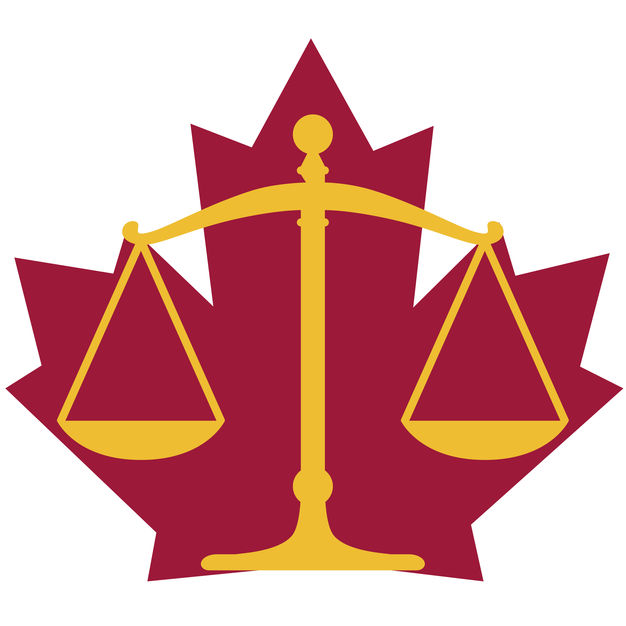 Fundamentals of Canadian Law
Fundamentals of Canadian Law
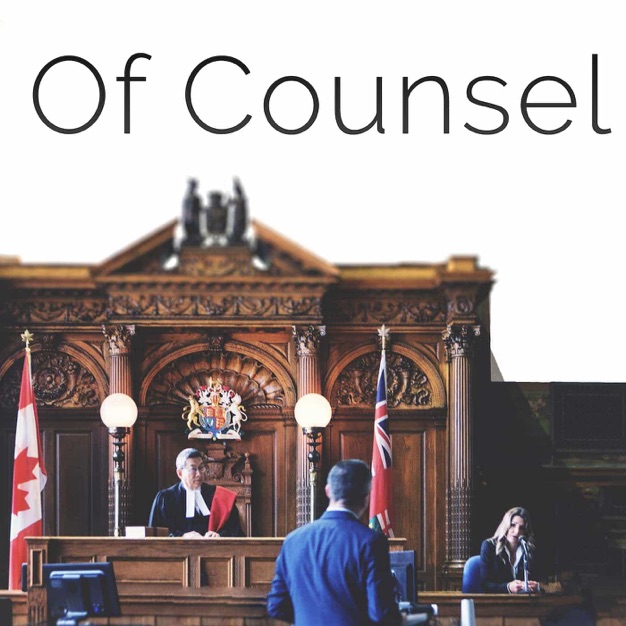 Of Counsel
Of Counsel
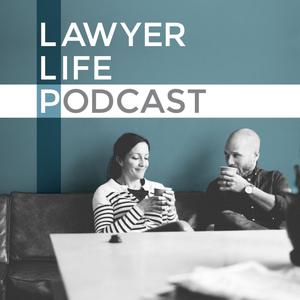 Lawyer Life Podcast
Lawyer Life Podcast
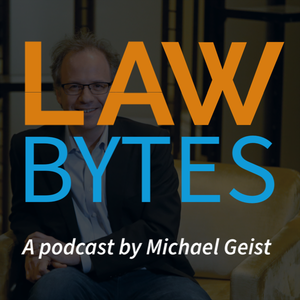 Law Bytes
Law Bytes
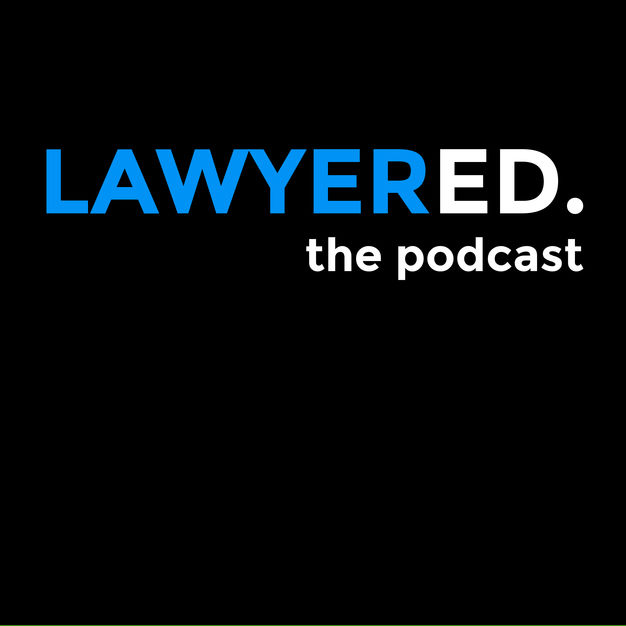 Lawyered
Lawyered